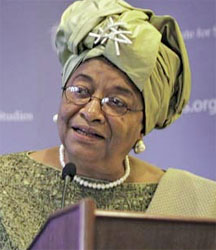MONROVIA, (Reuters) – After a dozen years of recovery under Ellen Johnson Sirleaf, who won the Nobel Peace Prize for helping bring peace after civil war turned her country into a wasteland, Liberians are hopeful about their first democratic power transfer for 73 years.
Twenty candidates are standing to replace Johnson Sirleaf in a first round tomorrow. With nobody likely to win a majority outright, the top two are expected to face each other in a run-off in around a month. While the election campaign has been rambunctious, it has been mainly peaceful so far, and most expectations are that it will come off without bloodshed.

Johnson Sirleaf, 78, has many accomplishments to boast since she became Africa’s first modern female head of state.
The economy is four times the size it was when she took office in 2005. The gangs of drug addled youths who raped and mutilated their way across the nation during a civil war that ended in 2003 are a vivid but receding memory.
Charles Taylor, the warlord who ruled in Liberia’s darkest days, is now in a British jail, serving a life sentence for crimes against humanity, including terrorism, pillage, rape, murder and sexual slavery — the first former head of state convicted by an international tribunal since Nuremburg.
Yet the country is still one of the world’s poorest. It survived another existential crisis three years ago with an outbreak of the Ebola virus that overwhelmed its health services. Residents complain of corruption from officials and poor public services, and say that while they are thankful for the peace that Johnson Sirleaf brought, they are excited about the prospect of change.
“For me, the only thing about this administration is peace. I gave her a plus in that,” said Timothy Sambulah, a taxi driver in the capital Monrovia. But, he said: “She has not been able to fight corruption. She failed to deal with people who took money to build their big houses.”
Among the front-runners seen as likely to win a place in the run-off are Vice President Joseph Nyuma Boakai, representing the ruling Unity Party, and football star George Weah, who lost to Johnson Sirleaf in 2005. Weah has served in the senate since 2014 for the opposition Congress for Democratic Change.
Candidates have held enthusiastic rallies attended by thousands of supporters wearing T-shirts, drenched by downpours in a carnival atmosphere.
Many have promised a break from the past. One poster carried around by opponents read: “Another six years of this…” with a photograph of a distressed woman seated in a damp home with walls made of corrugated iron.
“There will be no business as usual. We are going to end the era of selective justice so people are given equal protection under the law,” Charles Walker Brumskine, a lawyer running as the candidate of the Liberty Party, third biggest in Congress, told Reuters.
But one diplomat said it would be difficult to accelerate development just as millions of dollars in aid money pledged during the Ebola outbreak is drying up.
Liberia, Africa’s oldest republic, was founded by freed U.S. slaves in the 19th century.
Its recovery since the war has been remarkable. GDP for the country of 4.6 million reached $2.1 billion last year up from just $550 million the year Sirleaf Johnson took office.
A former finance minister in the 1970s who fled after a coup and worked for the World Bank and Citibank during her exile, she restored a measure of professionalism to a government that had been seized by a military junta in 1980 and collapsed under the predation of the warlords.
Outside her home country, Johnson Sirleaf has served as an ambassador for peace in an unstable region, donning colorful headscarves on diplomatic missions such as one last year to persuade Gambia’s ruler Yahya Jammeh to step down.
Still, many Liberians say she failed to stamp out graft and nepotism that have held the country back.
Her son Robert Sirleaf was a senior advisor and ran state oil firm NOCAL, which collapsed after his tenure as crude prices slumped in 2015. Her other son, Charles, was among 45 government officials suspended in 2012 for failing to declare their assets to anti-corruption authorities. She declared her own assets this year.
Last year a grand jury indicted government officials, including the speaker of parliament on charges including bribery.
“High level corruption has been a slap in the face for Liberians, most of whom live in abject poverty,” said Liberian political analyst Robtel Neajai Pailey who also criticized what she described as “hero worship” of Johnson Sirleaf.











